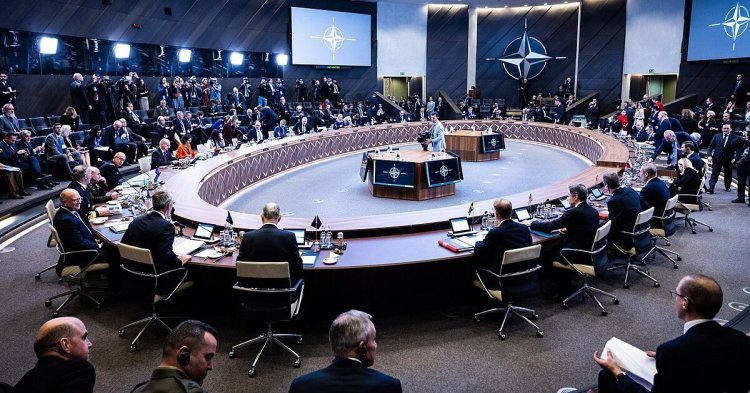Tensions have been brewing among the North Atlantic Treaty Organisation’s (NATO) member states, and especially the European ones, who are geographically closer to Russia, since the beginning of the Russia-Ukraine War. Nevertheless, the situation has not brought only distress due to the possibility of escalation but resulted in very good results for the military alliance, as it managed to create different levels of breakthrough with traditionally neutral countries. Hence, the following article will review the current ongoing situation of NATO’s enlargement process with these countries, which before the war were not considering any major shifts towards breaking their neutrality.
Positive effects of war?
War brings out a fascinating conundrum within humanity – it leads to undeniable progress on different fronts, which might have taken longer or not occurred at all without it. The political scientist Benjamin Ginsburg had researched on the subject deeply in his 2014 book “The Worth of War”, and concluded that indeed, the progress made by war, whether in technological advances, the economy, or even the spread of liberalism in the West, can and does occur. While other viewpoints exist, Ginsburg sheds light on another, less popular side of war: it’s positive aspects. In our case, we should examine how the war in Ukraine has managed to create positive security-based ripples within those who feel most at danger: European countries. While most EU Member States are affiliated with NATO, and hence, are protected by its Article 5, which mandates collective defence against an aggressor, a small number of European countries chose to remain neutral, and thus unprotected. That was the case until the outbreak of war in Ukraine in 2021. At the time, seven countries were completely neutral: Finland, Sweden, Austria, Switzerland, Ireland, Malta, and Cyprus. These seven countries had maintained their neutrality for decades, some even enshrining it as part of their national identity and constitution, without showing signs of getting closer to the NATO. However, with the outbreak of war, the idea of everlasting peace, established after the Second World War (WWII) and enhanced after the end of the Cold War, was shattered. Those countries had to choose whether to stay neutral and take the risk or change their historical course and join NATO in some capacity. The cases differ in context and will be explored in four groups:
The Change-makers – Finland & Sweden
Finland and Sweden, traditionally neutral countries, were the first and only neutral countries to completely drop their neutrality by applying to join NATO in response to a direct Russian threat on their borders following the assault on Ukraine. While this move was welcomed by most alliance members, it faced resistance from Hungary and Turkey, both NATO members with veto powers over new applications. Turkey’s approval of the two countries went through a lengthy and deliberately delayed negotiation process, as it accused both EU countries of harbouring Kurdish terrorist groups and demanded their extradition. Finland managed to appease Turkey first, but it took several more months for Sweden’s application to be approved, as relations were even more strained between the two. Kurdish protests in Sweden, including an effigy of Turkey’s President, Recep Tayyip Erdoğan being hanged, further complicated Sweden’s case. Moreover, a Danish far-right activist burned a Quran and made anti-Muslim and anti-immigration remarks outside the Turkish ambassador’s residence in Stockholm, an act protected as free speech in Sweden, but one that infuriated the Turkish government. Eventually, however, It did approve Sweden’s application. Hungary, meanwhile, criticised the two countries’ treatment of it, citing rule-of-law issues. While it approved Finland’s application rather quickly, it still played for time with Sweden’s, despite Viktor Orbán stating that his country would not be the last to approve it. Facing mounting international pressure from NATO, the US congress and the EU, Hungarian Speaker of the National Assembly László Kövér claimed there was “no rush to approve the bid”, citing Sweden’s past “arrogance and negligence towards Hungary”. Finally, after concessions from Sweden, Hungary ratified its application on February 26, 2024.
Both the Finnish and Swedish cases highlight the strengths and weaknesses of the alliance, particularly regarding the veto power of all member countries requires to admit new members. Now, it becomes apparent how crucial these countries are to NATO – Finland shares the longest land border with Russia, providing 280,000 possible troops and sits geographically close to Russia’s main cities, Moscow and St. Petersburg, while Sweden holds a strong position over the Baltic Sea. However, in both cases, Turkey and Hungary exerted pressure on the countries seeking to join, effectively placing the entire 30-member alliance under pressure to fulfil their own needs, potentially disregarding the alliance’s collective interests. Turkey’s actions were influenced by its ongoing campaign against Kurdish groups, with suggestions indicating potential gains such as easier access to American F-16 jets. Hungary’s reluctance stemmed from its internal rule-of-law issues, with the EU suspending billions of funds earmarked for Hungary, and Orbán’s close ties with Vladimir Putin, who perceives NATO expansions as a direct threat. Consequently, these cases exposed the alliance’s struggle in dealing with member states pursing individual agendas, effectively resorting to blackmail to secure internal benefits. Perhaps it is indeed time for NATO to understand how to address such future scenarios, whether by implementing sanctions against member states engaging in disruptive behaviour or pursuing individual agendas that undermine the alliance’s collective interests. Additionally, establishing a mechanism that allows for the expulsion of a member from NATO could serve as a deterrent against such rogue behaviour.
The Tiptoers – Austria & Switzerland Both countries, traditionally neutral, are experiencing shifts in their stance amidst geopolitical tensions due to the war in Ukraine. Austria, despite its neutrality, has contributed to sanctions against Russia but has avoided weapons sales. Nevertheless, winds of change have been blowing within the Austria parliament, as more than 90 experts and public figures published an open letter urging a reconsideration of the country’s cherished neutrality. All the while, Austrian Chancellor Karl Nehammer has emphasised the country’s tradition of neutrality and demanded its preservation. Within the Austrian public, there seems to be an inclination to change the country’s current stance on neutrality, as a poll in May showed that about 60% of Austrians are against joining NATO, with only 20% in favour. Meanwhile, Switzerland undergoes a similar process, but one could argue that breaking off from neutrality in Switzerland means shedding one of its enshrined national values and characteristics: its neutrality and ability to mediate conflicts, regardless of their nature. While maintaining no concrete NATO application plans, Switzerland’s sale of tanks to Ukraine through a Bavarian intermediary suggests a nuanced approach. Public opinion differs from Austria and evolves cautiously. In a poll done in January 2023, it was shown that the Swiss public shows a slight inclination toward NATO alignment while preserving neutrality.
The war, once unthinkable, has sparked great ripples of uncertainty and self-reflection regarding the idea of neutrality, particularly evident in the slow but deliberate steps taken by Austria and Switzerland. Unlike Finland and Sweden, which are in close proximity to Russia, Austria and Switzerland find themselves far from imminent danger. This geographical separation may explain their cautious approach compared to their Nordic counterparts. However, despite this distance, both countries have taken similar slow-paced steps, such as their mutual signing of a declaration of intent to join Sky Shield, a European air defence system initiated by Germany in response to Russia’s invasion of Ukraine. Delving deeper, Switzerland is also exploring the possibility of deploying conscripts for joint training missions and revising rules regarding the transit of foreign military personnel through its territory. As the old saying goes, “still waters run deep”, suggesting that Austria and Switzerland are unlikely to act hastily but rather are undertaking deliberate actions that may conceal greater intentions with strategic significance.
The Debater – Ireland
Ireland’s neutrality traces back to 1939. In 1949, despite being invited to join NATO, Ireland refused due to Britain’s being a member of the alliance and the unresolved issues of sovereignty over Northern Ireland. Although Ireland’s neutrality principles aren’t constitutionally enshrined, it holds significant importance in both the political sphere and public sentiment within the Republic. Like other non-NATO members, Ireland participates in NATO’s Partnership for Peace (PfP) programme and has joined the Euro-Atlantic Partnership Council, engaging in humanitarian aid and peacekeeping efforts. Despite the conflict in Ukraine, there hasn’t been any significant action indicating a potential shift in Ireland’s neutrality states. However, a debate has been sparked, both publicly and in political chambers. In June, a four-day public consultation was held to review the country’s neutral stance in light of the invasion of Ukraine. Although no concrete changes were made, President Michal D. Higgins cautioned that Ireland is “playing with fire” and risks “drifting” from its traditionally neutral defence policy towards NATO, potentially becoming entangled in others’ agendas. Meanwhile, Ireland’s foreign minister, Simon Coveney, suggested that neutrality may need to be “redefined” and could require a referendum. Additionally, Irish public opinion on neutrality appears to be evolving, as a March poll found that approximately 48% of the population support joining NATO, compared to 39% who oppose it. In the case of Ireland, only time will reveal the path it chooses, but as the world grows increasingly perilous, Ireland seeks public and political means to redefine its neutral stance.
The Islands of Certainty – Malta and Cyprus
The two Mediterranean islands, Malta and Cyprus, share a strict stance of neutrality and non-alignment, refraining from participating in military alliances. Malta, as defined by its constitutions is “a neutral state…adhering to a policy of non-alignment and refusing to participate in any military alliance”. However, Malta sporadically engages in NATO’s PfP programme and is a member of the Euro-Atlantic Partnership Council. During the 2023 UN Assembly, Prime Minister Robert Abela reiterated Malta’s commitment to neutrality, opposing military aggression and unilateral actions against the international community and the rules-based order. Nevertheless, there are concerns about Malta’s ability to maintain neutrality within the European Union, where decisions might be taken by majority voting, as recently said by the Maltese ambassador to France. Interestingly enough, Malta recently sought to become an associate member within NATO’s Parliamentary Assembly (NATO PA), albeit without voting delegates. While political discussions are ongoing, the public’s stance remains less clear. A poll conducted before Russia’s invasion of Ukraine indicated that approximately 63% of the Maltese population supported the country’s neutrality. Future polls will reveal if public opinion shifts to align with other European counterparts, potentially influencing political elites. Cyprus, with its divided status and troubled relationship with Turkey, faces complexities regarding NATO membership. Even as it is the only EU country not part of NATO’s Partnership for Peace (PfP) initiative, Cyprus continues to host significant British bases on the island. President Nicos Anastasiades expressed doubts about Cyprus joining NATO, citing potential veto powers from Turkey. Furthermore, the country’s Defence Minister, Charalambos Petrides, emphasised that Cyprus does not currently meet the terms and conditions necessary for NATO membership, confirming that it is not a viable option at present. As there is no available data regarding the public’s perspective on the island’s neutral stance, it remains likely, particularly with the Turkish-Cypriot conflict looming over, that Cyprus will be the last country in Europe to officially alter its neutral stance.
Against the backdrop of the world once again polarising into a two-axis reality, reminiscent of the previous two world wars, and human rights abuses once again becoming increasingly prevalent, its crucial to recall a pseudo-Dante Alighieri quote: “The hottest places in hell are reserved for those who, in times of great moral crisis, maintain their neutrality”. This quote may once again be apt in characterising those who choose not to take a side and avoid making an opinion for their own sake but going back to beginning of this article – war (despite its horrors) does entail positive and crucial changes, and the shift from neutrality is one of them.


Follow the comments: |
|
